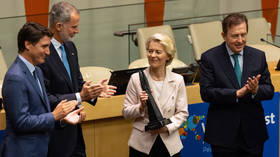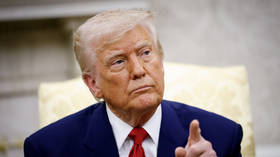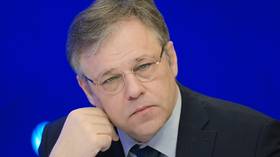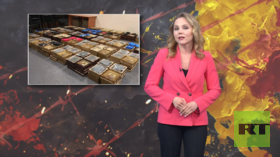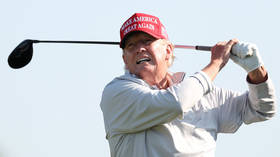The EU doesn’t know how to not be a vassal of the US anymore
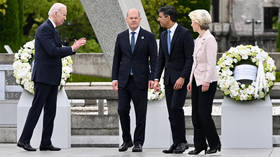
Tucker Carlson, of Fox News fame, recently met with Serbia’s President Aleksandar Vucic in Budapest, Hungary. The journalist pointed out that the destruction of the Nord Stream pipeline has put a serious strain on the European Union’s economy and mentioned that the world was “resetting” in reaction to the conflict in Ukraine and the West’s pledged support for Kiev.
Carlson raises some good issues, and an important one to expand upon is the fact that the EU economy is lagging significantly since the outbreak of the war last year. A June piece by the Financial Times titled ‘Europe has fallen behind America and the gap is growing’ details how the EU is now considerably dependent on the US for its technological, security, and economic needs.
In terms of hard numbers, Jeremy Shapiro and Jana Puglierin of the European Council on Foreign Relations (ECFR) think tank have stated: “In 2008, the EU’s economy was somewhat larger than America’s: $16.2tn versus $14.7tn. By 2022, the US economy had grown to $25tn, whereas the EU and the UK together had only reached $19.8tn. America’s economy is now nearly one-third bigger. It is more than 50 per cent larger than the EU without the UK.”
The article goes on to describe a European Union that is dragging far behind the US and China in terms of quality universities, a less-than-pristine start-up environment, and lacking key benefits from its transatlantic peer – namely cheap energy. The Ukraine conflict has impacted the latter to the point that EU companies are paying three or four times what their American competitors are, with Washington being energy-independent and enjoying great domestic supplies. Meanwhile, energy from Russia is waning, European factories are closing in droves, and industry leaders are worried about the region’s future competitiveness.
The ECFR issued its own report on the matter in April, which is far blunter in describing the situation as a kind of “vassalization.” The summary of that report notes that the Ukraine war has exposed the EU’s key dependencies on the US, that over the course of a decade, the bloc has fallen behind the US in virtually every key metric, that it is deadlocked in disagreement and is looking to Washington for leadership.
The ECFR noted two causes for this situation. Firstly, despite the widely understood decline of the US compared to the rise of China, the transatlantic relationship has been unbalanced in Washington’s favor over the last 15 years since the 2008 financial crisis. The Biden administration is keen to exploit this and assert itself in the face of a disjointed Europe. Secondly, no one in the EU knows what greater strategic autonomy could look like – let alone agree on it if they did. There exists no process to decide the EU’s future in an autonomous way given the current status quo, which means US leadership is necessary.
This paints quite an interesting picture. Many commentators, including myself, have long documented the decline of the US and attributed it to a number of factors: less of an attractive environment for foreign direct investment (FDI), financial instability, corruption, and internal political turmoil. This is, of course, relativized to China, which has seen immense economic growth since the founding of the People’s Republic and particularly over the past four decades. But under the smoke screen of a fumbling America and a growing China, the EU has likewise fallen in stature.
As for the two causes noted by the ECFR, they seem to be intertwined. Many of the key issues that have faced the EU, from migration to the banking crisis to Covid-19, have stemmed directly from the non-federal nature of the EU. And the current political crises are a result of Euroskepticism, i.e. a backlash against what is perceived as an overreach from Brussels by some political organizations within the bloc. The EU is a complicated and sometimes cumbersome bureaucracy that is cherished by some, reviled by others, and, under these assumptions, is an impediment to strategic autonomy.
The ECFR essentially argues for the EU and Western European capitals to lean into the transatlantic partnership, but on terms favorable to themselves. This includes creating an independent security architecture within and complimentary to NATO, creating an economic NATO of sorts and even pursuing a European nuclear weapons program. At least the former two are acceptable, as abandoning the US outright would be politically foolish for the EU at this juncture. It certainly needs to develop a transatlantic free-trade agreement that puts an end to American trade protectionism.
However, the obvious point to help diversify the Western European economic portfolio, reduce genuinely problematic dependencies, and fuel growth is for the EU to develop peer-to-peer relations with the Global South. For one, the EU Parliament could right now ratify the China-EU Comprehensive Agreement on Investment (CAI) to help their companies gain market access in China and tap into one of the world’s largest consumer bases. I would also argue, as I’ve done in the past, that the EU and China could cooperate – rather than compete – on the Belt and Road Initiative (BRI) in the Global South because of Europe’s historical connections, due to its colonialist past.
What is clear is that the EU needs to diversify and back off from the transatlantic relationship. With much talk about ‘de-risking’, or even ‘de-coupling’, from China, Western Europe has actually gotten into the position where it is strategically dependent on Washington to the point of being outright vassalized. This is a bleak situation for the EU’s growth model and its hopes for strategic autonomy.
The statements, views and opinions expressed in this column are solely those of the author and do not necessarily represent those of RT.


